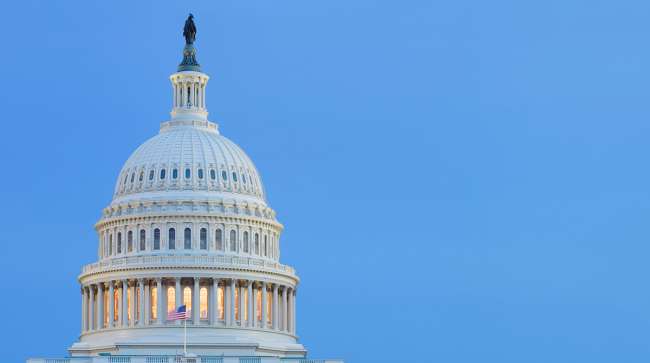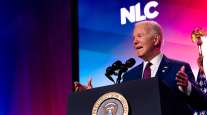Senior Reporter
Stakeholders Advocate Action on Biden’s Infrastructure Plan

[Stay on top of transportation news: Get TTNews in your inbox.]
With policymakers aiming to commence consideration of President Joe Biden’s $2.25 trillion infrastructure plan this spring, groups representing every corner of the transportation landscape appear united in their calls for action on Capitol Hill.
Stakeholders within the freight industry, business community, environmental organizations, labor interests and advocacy firms have joined various coalitions to raise attention about a need for improving the country’s infrastructure system.
With Democrats in control of the House, the Senate, and the White House, there is a growing expectation policymakers will approve either a comprehensive infrastructure package or smaller versions, such as a multiyear highway policy bill. Despite disagreements over ways to fund Biden’s so-called American Jobs Plan, at this moment the coalitions are mostly joining hands.
A key coalition led by the U.S. Chamber of Commerce and the Bipartisan Policy Center think tank is urging for passage of a package by July 4. Ideally, such a package would lead to repairs and updates for infrastructure projects, which would be central to the economy, and lead to additional, long-term employment opportunities.
Today we joined @BPC_Bipartisan and over 300 national & local orgs in sending a letter to Congress urging them to enact an #infrastructure package by the 4th of July that stimulates the economy & improves quality of life for all Americans: https://t.co/pF1y4rA60D #BuildByThe4th pic.twitter.com/IRrSvvqqON — U.S. Chamber (@USChamber) February 17, 2021
“Glad to see White House push for action on infrastructure. Not sure whether that means American Jobs [Plan] package or surface transportation [highway policy] authorization,” said Ed Mortimer, vice president of transportation infrastructure at the U.S. Chamber of Commerce. “Expect them to move separately.”
Since March, more than 300 organizations have joined the coalition. The groups include the American Society of Civil Engineers, the Transportation Intermediaries Association, the Laborers’ International Union of North America, the Natural Resources Defense Council and the American Public Transportation Association. Similarly to the “Build by the Fourth of July” coalition, next month the Transportation Construction Coalition, co-chaired by the American Road and Transportation Builders Association and the Associated General Contractors of America, intends to ramp up calls for action on the package. Stakeholders associated with this construction sector argue new comprehensive infrastructure measures would lead to significant economic growth.
“The president’s plan will accelerate a long overdue conversation about how to modernize our roads, bridges, public transit and other infrastructure systems. Members of Congress from both parties will rightly have their own policy thoughts,” ARTBA president and CEO Dave Bauer said. “The most important thing is not whose plan passes Congress, but that at the end of the process the American people have increased mobility and the competitiveness of the U.S. economy is strengthened.”
National groups representing rural housing, agriculture and autonomous technologies also have expressed support for Biden’s plan. These stakeholders have challenged each other over aspects of the transportation budget and policy. However, with Congress appearing committed to passing major transportation legislation, a type of truce is guiding the competing interests.
For Transportation for America’s Beth Osborne, the realization of gaining a massive victory on infrastructure would benefit everyone. As she put it, the Biden plan would be an opportunity for emphasizing a need for greater funding for non-vehicular modes of travel, racial equity and climate change.
“We have been talking about an infrastructure package for years and it has never gotten past a talking point. This seems to be the most serious effort yet, but when and how it comes together depends on how open the various factions on Capitol Hill are to making a deal,” Osborne said.

Osborne
“The only thing that matters is whether we are funding projects that restore infrastructure in need of repair, improve roadway safety after one of the most deadly years in decades, and provide Americans with access to jobs and essential services whether they can afford a car or not,” she added.
The White House is pressing Congress to legislate on the president’s plan, which proposes $115 billion for highways and bridges, $85 billion for transit, $80 billion for Amtrak, $25 billion for airports and $17 billion for inland ports. To fund the plan, the president proposes raising the corporate tax rate to 28% from 21%.
Congressional leaders point to May as a potential target for kicking off their legislative consideration. This month, the House Transportation and Infrastructure Committee will host a hearing for lawmakers to pitch ideas on infrastructure. Separately from an infrastructure bill is the nation’s premier highway law, which expires Sept. 30. Congress and the White House noted interest in updating that law prior to its expiration.
The bustling legislative agenda increases the likelihood for Congress to pass Biden’s big-picture plan, argued Jeff Davis, senior fellow at the Eno Center for Transportation. “You already got progressives saying that this [infrastructure] bill is not enough. So the Biden administration may have to make more explicit promises about what comes in the next big bill,” Davis said. “It’s got a chance but threading the needle in a six vote majority House and a 50-50 Senate is awfully difficult and, if they’re able to do it, you know, it’s going to be an epic achievement.”
Want more news? Listen to today's daily briefing below or go here for more info:




